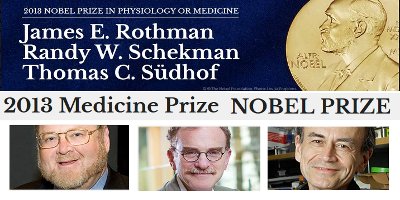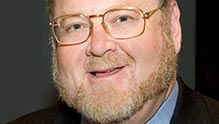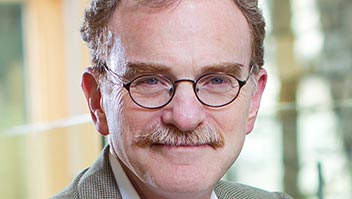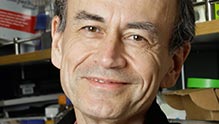The Nobel Prize in Physiology or Medicine 2013
The Nobel Prize in Physiology or Medicine 2013 was awarded jointly to James E. Rothman, Randy W. Schekman and Thomas C. Südhof "for their discoveries of machinery regulating vesicle traffic, a major transport system in our cells".
 This Year the Nobel prize in Medicine is shared by Three Scientists -Americans James E. Rothman of Yale and Randy W. Schekman of the University of California, Berkeley; and German-American Dr. Thomas C. Sudhof of the Stanford University School of Medicine “for their discoveries of machinery regulating vesicle traffic, a major transport system in our cells” or simply say for their contribution in understanding on the movement of key substances around within the cell.
This Year the Nobel prize in Medicine is shared by Three Scientists -Americans James E. Rothman of Yale and Randy W. Schekman of the University of California, Berkeley; and German-American Dr. Thomas C. Sudhof of the Stanford University School of Medicine “for their discoveries of machinery regulating vesicle traffic, a major transport system in our cells” or simply say for their contribution in understanding on the movement of key substances around within the cell.
Earlier Nobel Prize:
In 2012 - the prize was won by Sir John B. Gurdon and Shinya Yamanaka for their discovery that mature cells can be reprogrammed to become pluripotent.
In 2011- By Mr. Bruce A. Beutler and Jules A. Hoffmann for their discoveries concerning the activation of innate immunity and by Mr. Ralph M. Steinman for his discovery of the dendritic cell and its role in adaptive immunity.
In 2010- Mr. Robert G. Edwards for the development of in vitro fertilization.
In 2009- Mr. Elizabeth H. Blackburn, Carol W. Greider and Jack W. Szostak for the discovery of how chromosomes are protected by telomeres and the enzyme telomerase.
From the list of last five years it can be visualized that the Prize is shared by two or more scientists rather than won by a single Scientists and the discoveries are only concerned with internal cell processes.
The Winners of 2013
 James E. Rothman,(62)
James E. Rothman,(62)
Presently at Yale University, USA
Dr. Rothman, who was born in Haverhill, Mass., received a Ph.D. from Harvard Medical School in 1976 and was a postdoctoral fellow at the Massachusetts Institute of Technology. Then in 1978, he moved to Stanford, where he started his research on the vesicles of the cell. He has worked at Princeton University, the Memorial Sloan-Kettering Cancer Center and Columbia University. In 2008, he joined the faculty of Yale, where he is chairman of the department of cell biology.
In his earlier researches of 1980,s and 90,s he studied vesicle transport in mammalian cells. He discovered that a protein complex allows vesicles to dock and fuse with their target membranes and after the fusion of the vesicles, proteins on the vesicles and target membranes bind to each other like the two sides of a zipper. The fact that there are many such proteins and that they bind only in specific combinations ensures that cargo is delivered to a precise location; the same principle operates inside the cell and when a vesicle binds to the cell’s outer membrane to release its contents.
He determined that proteins known as SNARE (solubleN-ethylmaleimide-sensitive factor-activating protein receptor) allow vesicles to fuse with their target membranes and though these proteins had already been discovered by others, but their function was unknown. Rothman determined that these proteins interact with high specificity and they interact with only one or a few vesicle SNARE proteins.
 Randy W. Schekman (64), University of California, Berkeley
Randy W. Schekman (64), University of California, Berkeley
Born in St. Paul, Minn.,
Dr. Schekman discovered a set of genes that were required for vesicle traffic. The tiny vesicles, which have a covering known as a membrane, shuttle the cargo between different compartments or fuse with the membrane. The transport system activates nerves which also controls the release of hormones and enzymes and any disturbances in this control system for transporting and delivering cellular cargo cause serious damages to body and is believed to contribute to some neurological diseases, diabetes and immunological disorders.
This finding of Dr.Schekman enabled the biotechnology industry to use this for creating some industrial products like insulin and Hepatitis B vaccines and also to produce pharmaceutical drugs.
 Thomas C. Südhof (57), born in Göttingen, West Germany
Thomas C. Südhof (57), born in Göttingen, West Germany
Stanford University School of Medicine. USA
Dr. Sudhof studied neurotransmission, the process by which nerve cells communicate with other cells in the brain. He helped transform some rough outlines into a number of molecular activities to provide insights into the elaborate mechanisms at the crux of neurological activities.
The three winners discovered different aspects of the system. Schekman discovered a set of genes required for vesicle transport whileRothman determined the proteins that allow vesicles to fuse with their targets and thus transfer materials and Südhof discovered the signals that tell vesicles when to release their cargo.
“Together, Rothman, Schekman and Sudohof have transformed the way we view transport of molecular cargo to specific destinations inside and outside the cell,” said the Nobel Assembly at the Karolinska Institute in Stockholm. “Their discoveries explain a long-standing enigma of cell biology and also shed new light on how disturbances in this machinery can have deleterious effects and contribute to conditions such as neurological diseases, diabetes and immunological disorders,” it said.
Sources-
Google searches
4. www.wikipedia.com/nobelprize2013
5.www.nobelprize.com/all noble prizes/2013
Articles
1. Article on Nobel prize in medicine 2013
2. The Times of India- Noble prize in physiology
3. The Hindu- Article on Nobel prize in Medicine










